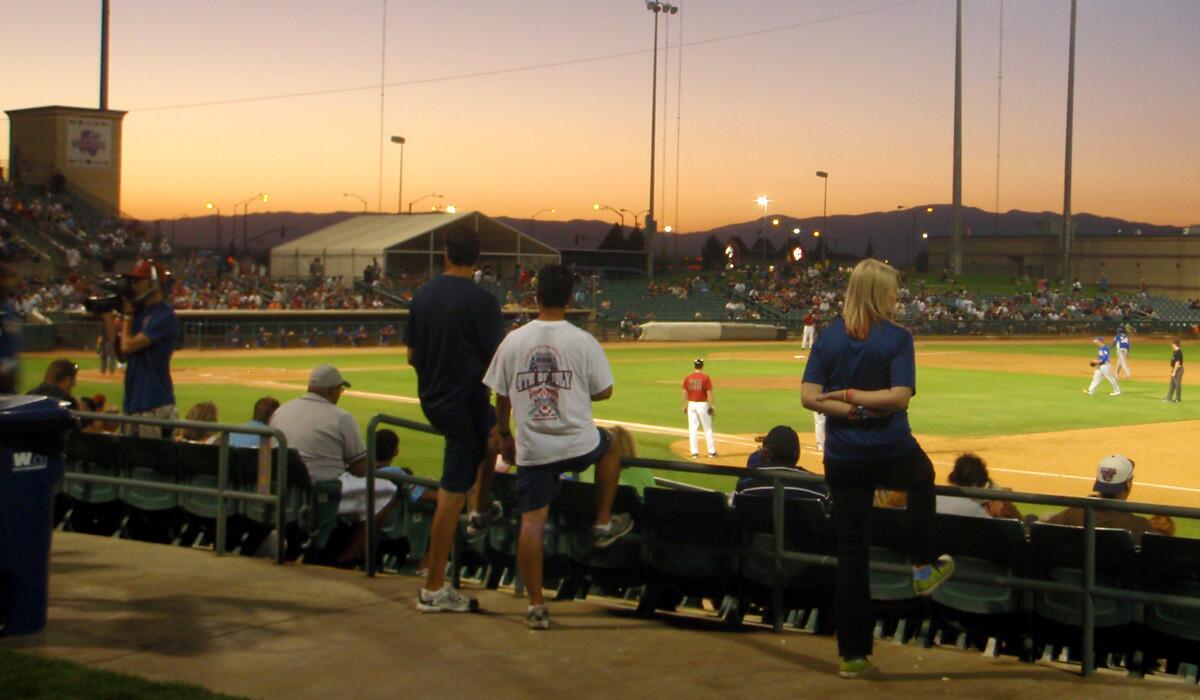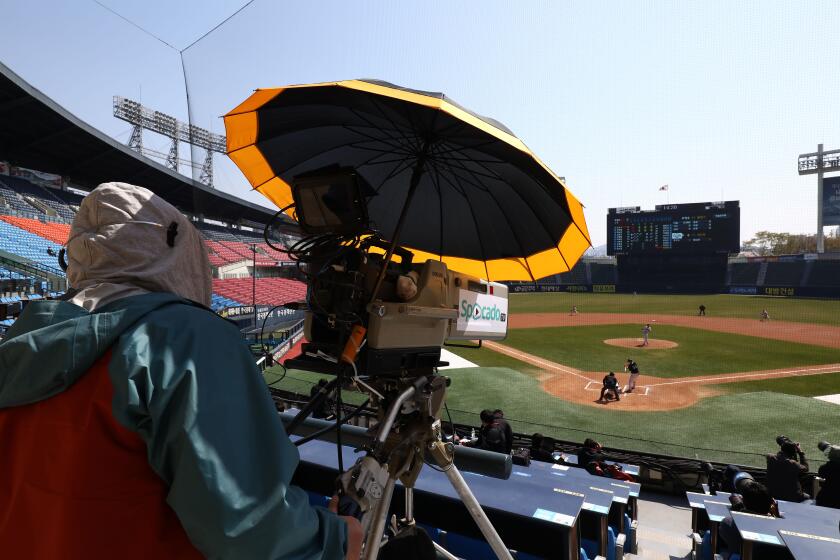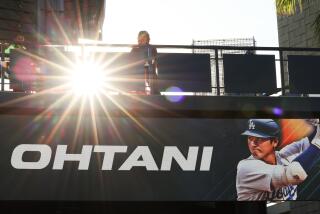Coronavirus might have robbed a baseball team of its farewell season

- Share via
In Lancaster, the temperature is forecast to fall into the low 40s on Thursday night. On what would have been opening night for the minor leagues, the JetHawks would not have given away T-shirts or bobblehead dolls.
The JetHawks would have given away beanies, the better to keep heads warm.
It is not just that minor league teams know their audience. It is that they know their community.
For the JetHawks and 119 other minor league teams across the country, the season will not open Thursday, as the coronavirus crisis puts sports on every level on an indefinite hold. The JetHawks are doing what they can for the Antelope Valley community: With schools closed, the team has provided reading logs, and any youngster who reads for 30 minutes every day gets a free ticket to a future game.
If, that is, the JetHawks play any more games.
With this season threatened by the coronavirus, and with future seasons threatened by Major League Baseball’s plan to eliminate the JetHawks and dozens of other minor league teams, the last pitch might already have been thrown for the only minor league team in Los Angeles County.
Would bringing back MLB amid the coronavirus crisis be a morale boost for a quarantined nation or an audacious grab of medical resources? Or both?
“I’ve not said that among the staff but, personally, clearly that runs through your mind at times,” said Tom Backemeyer, the JetHawks’ executive vice president.
The JetHawks represent more than affordable family entertainment. They are a living tribute to the aerospace history of the region. They play in a ballpark named the Hangar, with an F-18 Hornet on display. Just as costumed presidents race between innings in Washington and costumed sausages race in Milwaukee, costumed astronauts race in Lancaster.
Distinguished alumni include Jose Altuve, Alex Bregman, Josh Hader, Dallas Keuchel, Brandon Webb, and the Dodgers’ Kiké Hernandez.
These are perilous times for even the most stable minor league teams. There is no trickle-down from the billions that major league teams rake in from television networks.
Minor league teams spend money all winter — on cups and napkins, on bobblehead dolls and pocket schedules, on insurance and ballpark rent and staff salaries. They take in revenue during the summer, from fans who buy tickets and hot dogs and T-shirts.
“It’s hard to make money when the gates aren’t open,” JetHawks’ president Andy Dunn said.
The JetHawks are among the minor league teams applying for federal small business stimulus money. The team has 11 full-time employees, and no one has been let go.
“We’re trying to cut here, shave there,” Dunn said. “The one thing we’re trying to do is maintain jobs. If we don’t play at all, we’d have to take a look at paring down, but, if we do, it would be temporary, because we are expecting to play a 2021 season.”
Not so fast. The JetHawks were included on a preliminary list of teams major league owners targeted for elimination this fall, when the agreement between MLB and the minor league governing body expires. In recognition of the pandemic, negotiators for minor league baseball might ask MLB to extend the agreement for one year.
“Closing down minor league teams like the JetHawks would be a disaster for baseball fans, workers, and communities across the country,” Sen. Bernie Sanders said in November, during his presidential campaign that ended Wednesday. “We must protect these teams from corporate greed.”
In the service of more efficient and less costly player development, major league owners have publicly championed a minor league system that would include fewer players, better facilities and less onerous travel.
Lancaster sits close to the geographic heart of the California League, minimizing any travel burden. Dunn says the Lancaster stadium, which opened in 1996, is “better than most” in the league. Backemeyer says no one will tell the JetHawks why they are on the hit list or what they can do about it, but the suspicion is that thin air and high winds complicate player evaluation.
In the eight-team Cal League, Lancaster is the only one proposed for extinction.
“We’re planning on being around,” Dunn said. “I’m not interested in independent baseball. We’re a member of the Cal League, period.
A nation yearns for sports, a hint of normalcy, amid the coronavirus pandemic. But infectious disease experts wonder: Is it realistic?
“This is a great facility. This is a great community. It’s a place that deserves to have a franchise. You can’t debate me on that.”
No one might have more time for a debate now than Jason Schwartz, who was about to start his ninth season as the team broadcaster. He splits his sports year between the winter, when he is the voice of Long Beach State men’s basketball, and the summer, when he is the voice of the Jethawks.
On the morning of March 12, he found out the Big West Conference tournament was canceled, and with it the rest of his basketball season. On the evening of March 12, he found out his baseball season was postponed.
“The double whammy,” Schwartz said.
As a seasonal employee, Schwartz has filed for unemployment. In the meantime, what would have been opening day is upon us, and he said he expects to get together Thursday with some of his fellow California League broadcasters.
“Maybe that’s a FaceTime or a Zoom call,” he said. “Maybe we’ll toast to what would have been.”
More to Read
Go beyond the scoreboard
Get the latest on L.A.'s teams in the daily Sports Report newsletter.
You may occasionally receive promotional content from the Los Angeles Times.













